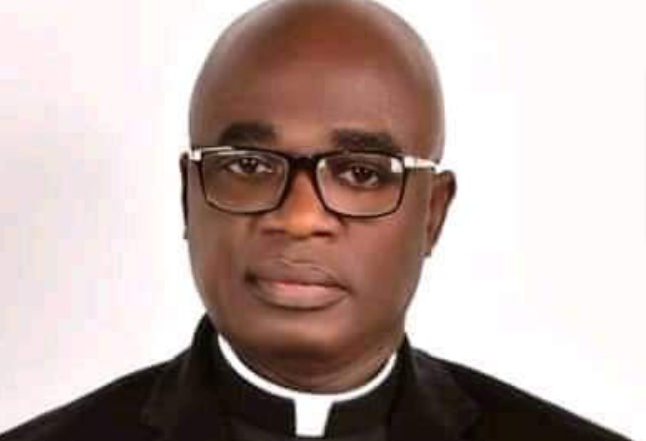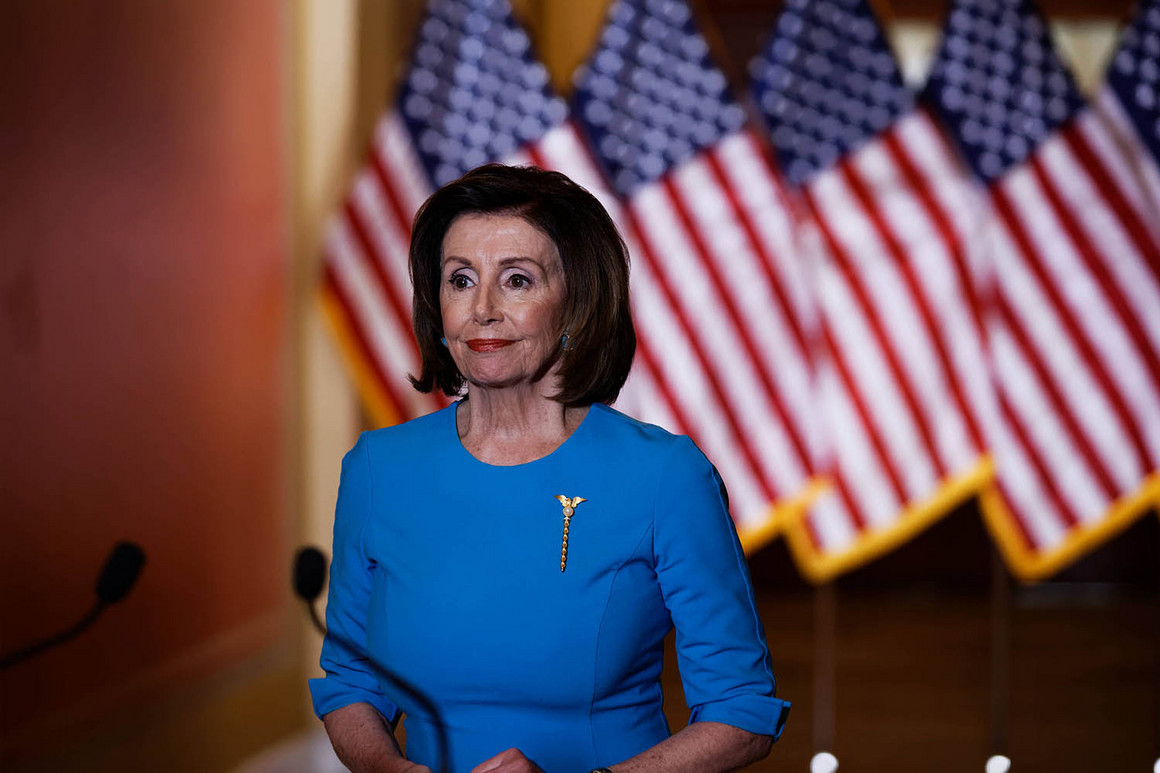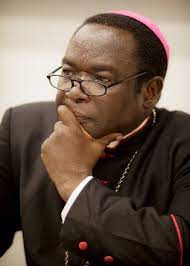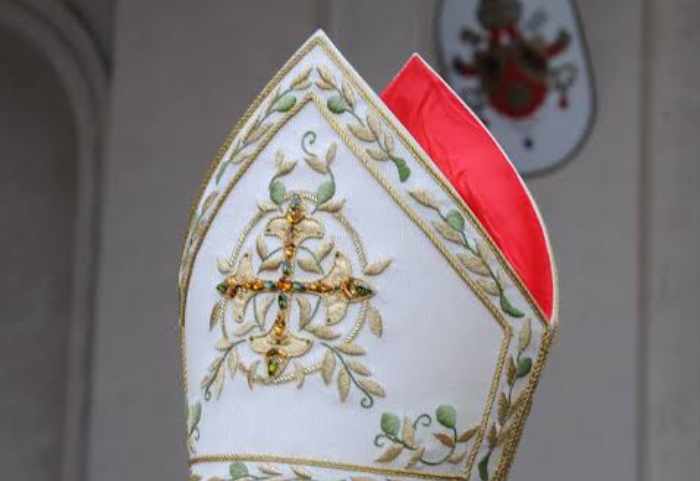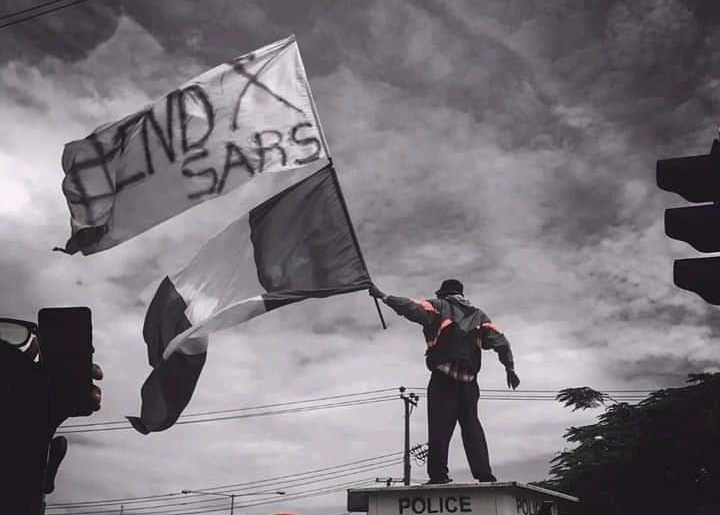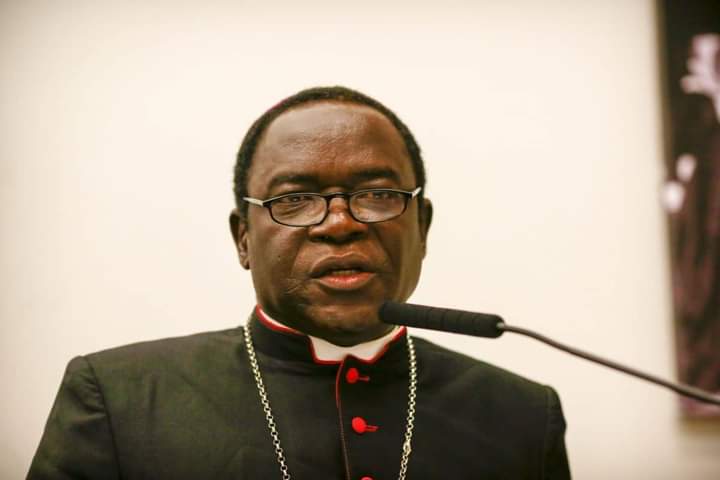The Catholic Bishop of Sokoto Diocese, Matthew Kukah, did not mince words during his Easter message as he lampooned President Muhammadu Buhari administration of having shown far greater commitment to integrating so-called repentant terrorists than getting school children and thousands of others back from kidnappers or keeping Nigerian universities open.
Homes are broken. Churches, Mosques, and infrastructure are broken. Our educational system is broken. Our children’s lives and future are broken. Our politics is broken. Our economy is broken. Our energy system is broken. Our security system is broken. Our Roads and Rails are broken. Only corruption is alive and well
His message, where he accused the President of having broken every aspect of Nigerians’ lives, was entitled, “To MEND A BROKEN NATION: THE EASTER METAPHOR.” It was dated April 17.
It reads in full:
Hello brothers and sisters in Christ, men and women of goodwill everywhere, I send you hearty greetings and felicitations as we celebrate the risen Christ. Easter is here again. For all Christians, Easter is a metaphor for our lives as individuals, families, communities or nations.
Easter is a metaphor for how shame, scandal, powerlessness, weakness, and opprobrium suddenly transform into glory, honour, pre-eminence, laudation and applause.
The real challenge before us now is to look beyond politics and face the challenge of forming character and faith in our country
It is a fulfillment of what the Master himself had foretold when He said, ‘Unless a grain of wheat falls on the ground and dies, it remains only a single grain, but if it dies, it bears much fruit’ (Jn. 12: 24). And the Psalmist had said, ‘Those who sow in tears will sing when they reap.’ (Ps. 126:5).
The crucifixion and resurrection of Jesus are central to the Christian faith and yet, as St Paul said, ‘We preach Christ crucified, a scandal to the Jews and nonsense to the Gentiles’ (1 Cor. 1: 23). St Paul continues: ‘What seems to be God’s foolishness is wiser than human wisdom and God’s weakness is stronger than human strength’ (1 Cor. 1:25).
Without the claims of the resurrection of Jesus Christ, millions of people would be Christian today. As with the times of Jesus, the very idea is preposterous and incomprehensible yet St. Paul still insists that ‘If Christ has not been raised, then our faith is a delusion and we are still in our sins’ (1 Cor. 15:17). It is faith in the resurrection of Christ that inspires us Christians to hold firmly to the fact that, like the people of Israel, our dry bones shall rise again (Ez. 37: 11).
As a priest, I cannot be against a repentant sinner or criminals changing their ways
Our dear country, Nigeria, still totters and wobbles as we screech towards a dangerous and avoidable canyon of dry bones. Nonetheless, we still cling to hope, a hope in the resurrected Christ, knowing as St. Paul said, ‘this hope does not disappoint us’ (Rm.5:5).
Nigerians can no longer recognise their country which has been battered and buffeted by men and women from the dark womb of time. It is no longer necessary to ask how we got here. The real challenge is how to find the slippery rungs on the ladder of ascent so we can climb out. Yet, we ask, ascend to where? For us as Christians, ascent is to the loving embrace of the resurrected Christ who is Lord of history.
It is hard to know whether the problem is that those in power do not hear, see, feel, know, or just don’t care
One would be tempted to ask, what is there to say about our tragic situation today that has not been said? Who is there to speak that has not spoken? Like the friends of Job, we stare at an imponderable tragedy as the nation unravels from all sides. The government has slid into hibernation mode.
It is hard to know whether the problem is that those in power do not hear, see, feel, know, or just don’t care. Either way, from this crossroad, we must make a choice, to go forward, turn left or right or return home. None of these choices are easy, yet, guided by the light of the risen Christ, we can reclaim our country from its impending slide to anarchy.
The greatest challenge now is how to begin a process of reconstructing our nation hoping that we can hang on and survive the 2023 elections. The real challenge before us now is to look beyond politics and face the challenge of forming character and faith in our country.
The greatest challenge for Nigeria is not even the 2023 elections
Here, leaders of religion, Christianity and Islam, need to truthfully face the role of religion in the survival of our country. The Nigerian Constitution has very clearly delineated the fine boundaries between religion and politics. Yet many politicians continue to behave as if they are presiding over both the political and the spiritual realms in their states rather than governing in a Democracy.
This conflict between Caesar and God is inbuilt in faith and is part of world history. Many religious leaders often measure their power by how close they are to Caesar, yet Caesar’s embrace is often full of thorns. The challenge is for the religious leader to know that both Caesar and those he represents are answerable to God who created them.
The welfare of citizens constitutes the cornerstone for measuring the legitimacy of any political leader. As such, religious leaders must focus more on the issues of welfare, safety and security of ordinary citizens. They must raise their voice when these rights are being trampled upon. A leader must know when to call Caesar a fox and not a horse (Lk. 13:32).
We cannot continue to pretend that there are no religious undertones to the violence
The greatest challenge for Nigeria is not even the 2023 elections. It is the prospect for the reconciliation of our people. Here, the Buhari administration sadly has divided our people on the basis of ethnicity, religion, and region, in a way that we have never witnessed in our history.
This carefully choreographed agenda has made Nigerians vulnerable and ignited the most divisive form of identity consciousness among our people. Years of friendships, cultural exchange, and collaboration built over time have now come under serious pressure from stereotyping. Notwithstanding these challenges, religious leaders must recover and deploy their moral authority and avoid falling victim to the schemes of politicians and their material enticements.
Today, the values of Interfaith dialogue have come under severe strain and pressure with extremists from both sides of our faiths denigrating the idea of dialogue with their counterparts of other faiths. Ignorance and miseducation have combined with prejudice to create the falsehood that somehow, one religion is superior to the others. With so many ill equipped fraudsters posing as religious leaders, there is an obsession with defaming others and widening our differences.
Religious leaders must face the reality that here in Nigeria and elsewhere around the world, millions of people are leaving Christianity and Islam. While we are busy building walls of division with the blocks of prejudice, our members are becoming atheists but we prefer to pretend that we do not see this. We cannot pretend not to hear the footsteps of our faithful who are marching away into atheism and secularism. No threats can stop this, but dialogue can open our hearts.
Thank God, in the last few years, we have had some good news from outside the shores of Nigeria. The most noteworthy is the initiative undertaken by both Pope Francis and the Grand Imam of Al-Azhar Mosque, Egypt, Shaikh Mohammed Al-Tayeb in 2019, when both of them met and signed the Document on Human Fraternity.
It seems that the federal government has shown far greater commitment to integrating so called repentant terrorists than getting our children back from kidnappers or keeping our universities open
Pope Francis followed up with the publication of an Encyclical titled, Fratelli Tutti, We are all Brothers, in 2020. The following year, the United Nations’ General Assembly declared February 4, World Day of Fraternity. Both leaders agreed that: ‘We need to develop the awareness that nowadays, we are either all saved together or no one is saved. Poverty, decadence, and suffering in one part of the earth are a silent breeding ground for problems that will end up affecting our entire planet.’
We need to start thinking of a Nigeria beyond banditry and kidnapping and the endless circles of violence that have engulfed our communities and nation. We cannot continue to pretend that there are no religious undertones to the violence in the name of God that has given our religions a bad name.
The way out is for the state to enforce the secular status of the Nigerian state so as to give citizens the necessary freedoms from the shackles of semi-feudal confusion over the status of religion and the state in a plural Democracy. We must be ready to embrace modernity and work out how to preserve our religions and cultures without turning religion into a tool for tyranny, exclusion, and oppression.
It speaks volumes when the President and his military hierarchy choose to believe these young men who took up arms
In finding our way forward, the President must concede that it is within his powers to decide how we are going to end the war that has engulfed and is tearing down our nation. It seems that the federal government has shown far greater commitment to integrating so called repentant terrorists than getting our children back from kidnappers or keeping our universities open.
Earlier last month, Operation Safe Corridor announced that it had graduated 599 members of various terrorist groups who have acquired new skills and are now ready to be integrated into society.
The total comes to over a thousand now. It is plausible to note that the programme involves psycho-social support, rehabilitation, vocational training, skill acquisition and start-ups. Despite all this, the larger issue is that their various communities have expressed their reluctance to receive their erring sons back.
Nigerians have no access to the transcripts of the texts of the confessions of these terrorists not to talk of evidence of their commitment to not sin again. We have only the words of the terrorists and the same military that they have been fighting a war with.
Are we to assume that they (terrorists) have become acknowledged models for Nigerian youth?
It speaks volumes when the President and his military hierarchy choose to believe these young men who took up arms and for years waged war against their country, killed, maimed and wasted thousands of lives, destroyed entire communities and now, they are being housed, fed, clothed with public funds. All this while their victims have been forced to make the various IDP camps their new homes! Where is the justice for the victims and the rest of the country they have destroyed?
As a priest, I cannot be against a repentant sinner or criminals changing their ways. After all, the doors of forgiveness must always remain open. However, in this case, Nigerians have very little information as to the entire rehabilitation processes. Have these terrorists felt the heat or have they seen the light or, is their repentance a mere strategic and tactical repositioning? So far, we have no evidence that these terrorists have been able to confront their victims not to talk of seeking forgiveness from them.
Something is wrong. We see these terrorists adorned in our national colours in their green and white kaftans, trousers, and looking like heroes of the state! Are we to assume that they have become acknowledged models for Nigerian youth? Perhaps the next graduating set might be treated to Presidential handshakes, receptions at the villa with full national colours!
Only last week, as if in delayed solidarity, the Jama’atu Nasril Islam, JNI, in a Statement stated that: ‘It appears that the continuous callous acts of mayhem, killings and arson happening almost on daily or weekly bases around us; either within communities or on the roads we ply, has automatically reset our human psyche that we now have accepted such dastardly acts as part of our lives, to the extent that we no longer feel it.
Our humanity is being eroded and that erosion is becoming a new normal
Any government that is incapable of protecting the lives of its citizens has lost the moral justification of being there in the first place. Our humanity is being eroded and that erosion is becoming a new normal. Similarly, the Northern Elders Forum, NEF, and the House of Representatives have finally called on the President to resign since, in their view, it is now clear that he cannot protect his citizens. This has come three years after the Catholic Bishops’ Statement issued on April 26th, 2018 made the same call that was greeted with cynicism.
The challenge of fixing this broken nation is enormous and, as I have said, requires joint efforts. With everything literally broken down, our country has become one big emergency national hospital with full occupancy. Our individual hearts are broken. Our family dreams are broken.
The next President of Nigeria must be a man or woman with a heart, a sense of empathy and a soul on fire
Homes are broken. Churches, Mosques, and infrastructure are broken. Our educational system is broken. Our children’s lives and future are broken. Our politics is broken. Our economy is broken. Our energy system is broken. Our security system is broken. Our Roads and Rails are broken. Only corruption is alive and well. So, we ask with the Psalmist, We look up to the hills, from where shall come our help? Our help shall come from the name of the Lord (Ps. 121:2).
2023 beckons and the stage is set. The challenge is whether we have learnt any lessons from the tragedy that has afflicted us in the last few years. The Presidency of Nigeria is not a human right based on ethnic, religious or regional sentiments.
The next President of Nigeria must be a man or woman with a heart, a sense of empathy and a soul on fire that can set limits to what human indignities visited on citizens that he or she can tolerate. We have no need for any further empty messianic rhetoric laced with deceitful and grandiose religiosity. We need someone who can fix our broken nation, rid our people of the looming dangers of hunger and destitution.
Our Presidential aspirants must show evidence from their legacies and antecedents that they know the country well enough and its severe wounds. Whoever wants to govern us must illustrate that he or she understands what has turned our nation into a national hospital and show us plans for our discharge from this horror. Support for INEC and its infrastructure is fundamental to a free and fair election and we condemn in very strong terms all those criminals who continue to threaten the society with violence. They should meet the full force of the law.
I thank the President for accepting the report of the Committee on the Prerogative of Mercy and granting pardon to over 150 Nigerians serving various terms of imprisonment. The more serious challenge is to immediately free all innocent Nigerians who are held captive and whose only crime is that they are living in Nigerians.
We Christians believe that to redeem the world, Christ allowed His body to be broken. We know He can heal our broken nation
With the news of the purchase of new sophisticated weapons, we hope that the President and the military will quickly roll out a strategy for routing this cancer that has afflicted our country. The general feeling is that the military has the capacity to end this tragedy. In reality, the military cannot fire beyond the radar set by their commander-in-chief. If the President can end this tragedy, he will immediately get the support of all citizens and hopefully leave office with his head held high.
We cannot end this Message without sparing a thought for the untold sufferings being experienced by the people of Ukraine as a result of the invasion of their country by Russia. We turn in prayer to the Lord to touch the hearts and minds of those in power and in position to reverse this avoidable loss of human lives. May the spirit of the resurrected Christ and the appeals of all men and women of good will help to bring an end to this human tragedy.
Finally, in the last few years, my Messages have been borne out of a sense of moral revulsion over how life has been destroyed in my country. No country anywhere in the world is undergoing these self-inflicted wounds, citizens randomly murdering innocent citizens and getting away with it. For me as a Christian, there is a minimum threshold of human indignity that I can live with because the reason why Jesus came is so that all of us will have life and have it to the full (Jn. 10:10).
We must shout at what diminishes any and every life in our society. Once human dignity is respected and restored, we will change our tone, but for now, our voice must have a sense of urgency. We Christians believe that to redeem the world, Christ allowed His body to be broken. We know He can heal our broken nation. May the light of His resurrection scatter the clouds and rout the men of evil, inspire a new birth in our dear nation and restore us to wholeness. A happy Easter to you all.
